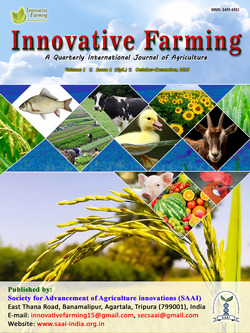
Soil Health Improvement using Biochar Application in Sikkim: A Success Story
Shaon Kumar Das*
ICAR-National Organic Farming Research Institute, Tadong, Gangtok, Sikkim - 737102, INDIA
R. K. Avasthe
ICAR-National Organic Farming Research Institute, Tadong, Gangtok, Sikkim - 737102, INDIA
Matber Singh
ICAR-National Organic Farming Research Institute, Tadong, Gangtok, Sikkim - 737102, INDIA
Ashish Yadav
ICAR-National Organic Farming Research Institute, Tadong, Gangtok, Sikkim - 737102, INDIA
DOI: NIL
Keywords: Biochar, TSP, organic manure, leaching
Abstract
Farmers of Sikkim are quite unaware about different innovative modern organic input, techniques of soil health management and innovative technologies they are bound to cultivate agricultural crops in traditional manner. Farmers of Sikkim generally don’t know how the soil health can be improved. This study was conducted during the period of 2015-16. After distributing the inputs under Tribal Sub Plan (ICAR-TSP) to tribal farmers in Sikkim survey was conducted to assess the impact of such organic input. The addition of biochar + RD of organic manure increased maize yield by 24% as compared to RD of organic manure. Biochar addition @ 5.0 t/ha increased the specific root length and decreased both root diameter and root density, indicating fine root proliferation which favours the resource acquisition by increasing biochar-root interaction and the organic input efficacy. Application of biochar reduced overall cumulative losses of NO3--N via leaching at 0-15 cm by 14.7%. The cost of biochar produced by farmers using the biomass created during/after harvest and/or from other economical sources comes to around Rs 3-5 a kg. If anyone wishes to prepare commercially from woody substances, it is also available for Rs 9-12 a kg. But, biochar prepared from locally available weed biomass will be available at zero cost. Thus, the input distribution was very much successful and now the farmers are getting more yields using our technology and they are now trying to do the technology in their own farm land.
Downloads
not found
